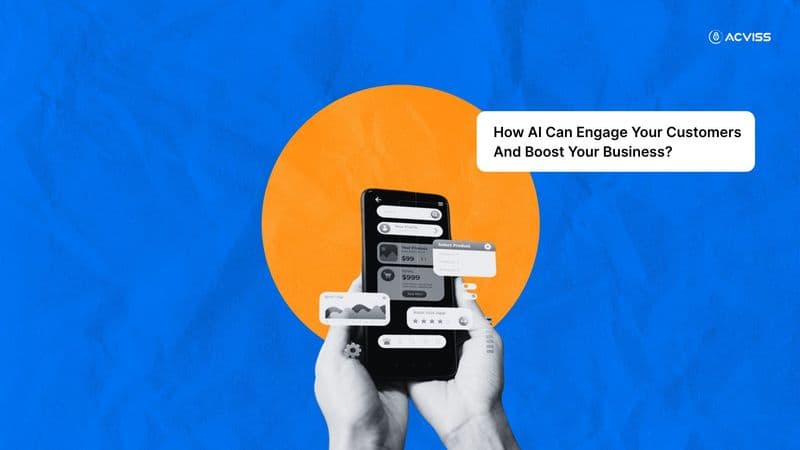How AI Can Engage Your Customers And Boost Your Business?

AI-Powered Technologies are Transforming Customer Support
In today's fast-paced digital world, businesses are constantly seeking innovative ways to enhance their customer engagement and support. One technology that has emerged as a game-changer in this realm is Artificial Intelligence.
The rise of AI has opened up new possibilities for businesses to connect with their customers in more personalized and meaningful ways. AI-powered solutions offer unique opportunities to understand customer preferences, deliver tailored experiences and ultimately boost business performance. Research conducted by Gartner shows that brands that have successfully implemented AI for improving customer experience will see a 25% increase in profit by 2023, underlying the importance of customer experience and using AI solutions to improve them.
Understanding Customer Preferences: The Power of Data

One of the key advantages of leveraging AI in customer engagement is its ability to process vast amounts of data quickly and efficiently. With the help of AI algorithms, businesses can collect, analyze and interpret customer data from multiple sources such as social media, online interactions and purchase histories. This wealth of information provides valuable insights into customer preferences, behaviours and patterns.
83% of consumers are willing to share their data to create a more personalized experience. By utilizing AI-powered analytics, businesses can uncover hidden patterns and trends within the data, enabling them to understand customer preferences on a deeper level. This knowledge empowers businesses to offer personalized recommendations, targeted promotions and tailored experiences, ultimately increasing customer satisfaction and loyalty.
1. The Rise of Generative AI: Enhancing Efficiency and Convenience
Generative AI can revolutionize the way businesses interact with their customers and create memorable experiences. AI-powered chatbots have become increasingly popular in recent years, thanks to their ability to provide instant and round-the-clock support. Generative AI models can be trained to generate human-like responses, ensuring a seamless and personalized customer experience and assisting customers in resolving their queries and issues. By 2027, the primary customer service for brands will be done by chatbots.
a. Instant Support: Chatbots offer immediate assistance, reducing the wait time for customers. They can provide instant responses to frequently asked questions and perform basic tasks such as product recommendations, order tracking and reservation bookings.
b. Cost Savings: Implementing chatbots can lead to significant cost savings for businesses. According to Juniper Research, chatbots are projected to have saved businesses over $8 billion per year in 2022. By automating routine customer inquiries, companies can free up human resources for more complex and value-added tasks.
c. Personalization: Advanced chatbots leverage AI algorithms to analyze customer data and deliver personalized experiences. They can remember customer preferences and purchase history and provide tailored recommendations, creating a more engaging and customized interaction.
2. Virtual Assistants: Transforming Self-Service and Support
Virtual assistants, another AI-powered technology, have gained immense popularity for their ability to deliver personalized support through voice interactions. These assistants, such as Amazon's Alexa, Apple's Siri and Google Assistant, are revolutionizing the way customers interact with brands.
a. Voice-Activated Convenience: With virtual assistants, customers can perform various tasks using voice commands, eliminating the need for manual inputs. From checking the weather forecast to ordering products, virtual assistants provide a seamless and hands-free experience.
b. Improved Self-Service: Virtual assistants empower customers to find answers to their queries independently. They can search for information, access product guides, and troubleshoot issues without the need for human intervention. This self-service capability enhances customer satisfaction by providing quick and efficient resolutions.
c. Omnichannel Support: Virtual assistants are capable of integrating with multiple platforms and devices, offering omnichannel support. Customers can interact with the virtual assistant through smartphones, smart speakers, and even wearable devices, ensuring a consistent and cohesive experience across touchpoints.
3. Predictive Analytics: Anticipating consumer needs
Another way AI can engage customers is through predictive analytics. By analyzing past customer behaviour and preferences, AI algorithms can anticipate future needs, allowing businesses to stay one step ahead.
a. Influence Purchasing decision: AI can predict when a customer is likely to make a purchase, prompting businesses to offer personalized discounts or incentives, thereby increasing the chances of conversion.
b. Recommend Products: According to a study conducted by Accenture, 75% of customers are more likely to purchase a business that recognizes them by name, recommends products based on past purchases, or knows their purchase history. This demonstrates the significant impact of personalized and anticipatory experiences on customer engagement and revenue generation.
4. Natural Language Processing: Enabling Human-Like Interactions
A key component of AI-powered customer engagement is Natural Language Processing (NLP). This enables machines to understand and interpret human language, facilitating more natural and human-like interactions between customers and AI systems.
a. Sentiment Analysis: NLP algorithms can analyze customer sentiment by analyzing text or voice inputs. This allows businesses to gauge customer satisfaction levels and identify potential issues in real time. By understanding customer emotions, companies can proactively address concerns and improve overall customer experience.
b. Language Adaptation: It enables AI systems to adapt to different languages and dialects, catering to a global customer base. This multilingual capability eliminates language barriers, ensuring that businesses can provide support to customers worldwide.
5. AI-Driven Marketing: Targeted Campaigns
Effective marketing campaigns rely on reaching the right audience with the right message at the right time. AI-powered tools can help businesses achieve this by leveraging customer data to create targeted marketing campaigns. In a study conducted among marketers, 88% reported measurable improvements in their marketing performance after implementing AI-driven personalization.
a. Simplified Process: AI algorithms can analyze customer behaviour, preferences, and demographics to identify the most relevant segments for specific products or services.
b. Increased Return: With AI, businesses can automate and optimize marketing campaigns, leading to improved conversion rates and higher returns on investment.
A necessary tool!

In conclusion, AI is a powerful tool that can revolutionize customer engagement and drive business growth. These technologies enhance efficiency, convenience and personalization while enabling businesses to provide round-the-clock support. But it does not limit to just customer engagement, AI is a powerful tool for identifying and eliminating the counterfeits and scams around the world. Both online and offline channels can be actively monitored for any fraudulent activities that take place.
Acviss’s Truviss employs Artificial Intelligence and Machine Learning algorithms to scan the domain, social media, apps and products to find fake and fraudulent listings. They also flag and remove scams in the form of fake ads, posts, offers, websites and tweets and instantly report them to the brands.
So in short, by harnessing the power of AI, businesses can gain a deeper understanding of customer preferences, deliver personalized experiences, provide efficient customer service, and ensure the quality of the product and the safety of the customer. As AI continues to evolve, the opportunities for businesses to engage their customers and boost their bottom line are endless. Embracing AI-driven solutions is not only a strategic move but a necessity in today's highly competitive market.